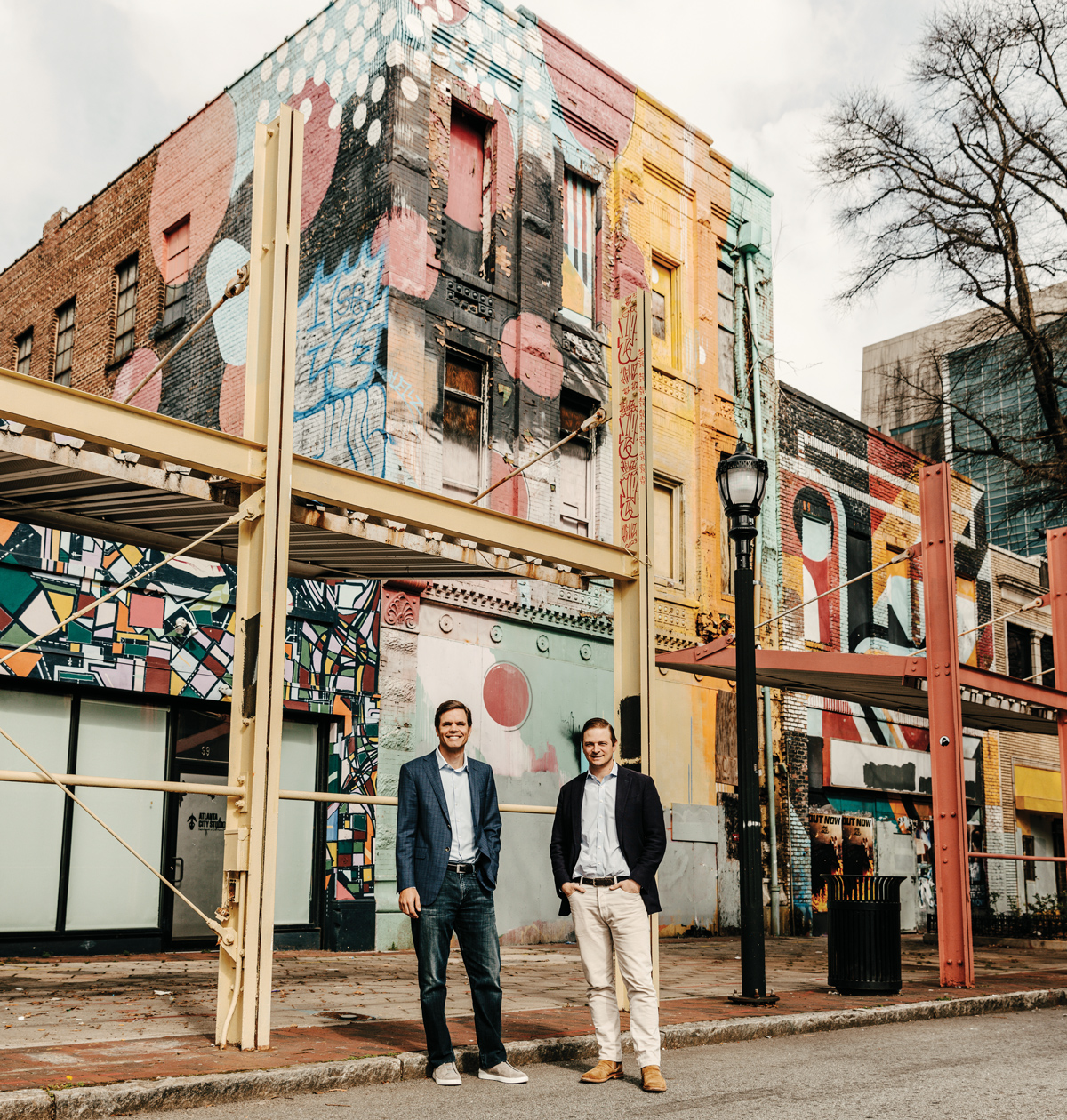
Photograph by Growl
Around noon on New Year’s Day, the guy credited with putting Atlanta on the national tech startup map sent a text message about South Downtown. “Hey, if we hosted a public tour and lunch tomorrow, how many folks do you think we could get?” David Cummings asked. “Ten?”
The recipient of the text—as he often is for Cummings’s off-the-cuff ideas—was Jon Birdsong. Birdsong is a partner in Cummings’s company, Atlanta Ventures, which launched Buckhead’s small-business incubator, Atlanta Tech Village, in 2012.
“Yeah, maybe 10 or 15 people,” Birdsong replied to Cummings. He put an open invitation on social media to meet at Thai restaurant Tyde Tate Kitchen, housed in South Downtown’s revitalized, but mostly empty, Hotel Row.
Twenty-four hours later, the crowd spilled out of the restaurant and onto the Mitchell Street sidewalk. Like a blond Pied Piper in an overcoat and Atlanta United scarf, Birdsong led over 100 curious locals, media representatives, and real estate players on a tour of South Downtown, an eight-block stretch of historic buildings tucked between Underground Atlanta, the Gold Dome, and Mercedes-Benz Stadium. The once-proud streets have limped through decades of vacancy and decay, but the tour’s huge turnout emphasized the area’s eternal appeal. “It’s amazing how much passion there is for South Downtown,” says Cummings. For these two serial entrepreneurs, there’d better be.
Cummings is a Tallahassee native who moved to Atlanta in 2002 and made an estimated $95 million fortune selling his marketing automation firm, Pardot. Birdsong is from Brookhaven, attended the Olympics as a kid, and celebrated several monumental Braves victories downtown. The pair met in 2009 when Birdsong cold-emailed Cummings, simply asking for advice about startups.
The business partners are more tech entrepreneurs than real estate developers, but, like many in Atlanta, they’d followed the saga of Germany-based Newport RE’s plans for the neighborhood. Newport, sensing an overlooked corner of Atlanta’s red-hot market, spent north of $150 million in 2017 to assemble an astonishingly huge portfolio of South Downtown property. They envisioned a vibrant adaptive-reuse cityscape with gleaming new apartment towers lording above the historic storefronts. But that dream ended in 2023 when Newport jumped ship, its European investors fed up with pandemic-induced construction delays and rising interest rates. Cummings and Birdsong watched in shock as Newport tried to bundle the property off to Atlanta-based developer Braden Fellman Group, but the sale, mired in foreclosure complications, quickly fell apart. Last October, the Atlanta Ventures duo toured Newport’s properties with vague notions of creating a downtown outpost of the Buckhead tech hub. Birdsong looked at Cummings and thought: Oh my, David’s going to do this.
What Newport had toiled for seven years to accumulate took Cummings less than two months to purchase, through deals with seven different lenders. As of this writing, Atlanta Ventures’ new LLC, SoDo Atlanta, now owns all of Newport’s former holdings, save one. Cummings isn’t disclosing yet what he paid for such a hefty chunk of downtown, but says he’s pleased with the sale price: “You never know what something’s worth, [but] it feels good right now.”
• • •
Robyn Jackson, a South Downtown resident since 2000 and longtime president of the Atlanta Downtown Neighborhood Association, literally cried into his vodka tonic the day Newport’s exit was revealed. With a major redevelopment finally beginning in the nearby Gulch, Jackson’s neighborhood had calmed down since the days when Broad Street was typically filled with, as he describes it, “70 to 100 drug dealers and gangs.” Jackson and his husband stuck with South Downtown anyway—their drug-dealing neighbors fondly nicknamed them “The Judges” for their business attire—but they hoped for more investment in the area.
At first, Jackson was befuddled by the news of tech incubator guys swooping in. “We were all like, what?” he says. “And then all of a sudden, the lightbulb started going off—that’s exactly who can come in and do this.”
After all, Atlanta Ventures isn’t exactly new to this. In 2012, Cummings took a banal office building on Piedmont Road and morphed it into the country’s fourth-largest incubator, practically inventing Atlanta’s status as a launchpad for young entrepreneurs beyond the Fortune 500 club. Atlanta Tech Village houses more than 300 startups and 1,200 “villagers” today, and has raised over $3 billion in capital since its launch.

Photograph by Growl
Cummings wants to repeat that success in South Downtown, though almost all of the 900,000 square feet of existing space needs at least two years’ worth of work. He’s confident that 100 startups will be operating in existing buildings by late 2025, injecting some 400 workers into the neighborhood, engaged in fields like cloud software and robotics.
By the time crowds flood in for the 2026 World Cup, the duo envisions Hotel Row bustling with shops and restaurants, with construction underway to transform today’s parking lots into new mixed-use buildings with “gentle density”—i.e., not skyscrapers—filled with offices, hotel rooms, and apartments, affordable housing included. “We want Atlantans from every part of Atlanta to be part of this neighborhood revitalization,” adds Birdsong. “And we also want to build housing that’s affordable to Atlantans who live and work in the city.”
Cummings foresees the project as “a full startup city, everything that you’d need.” He calls it a 10-year project, one they’ll hold on to longer rather than sell off, and even grow if the right property comes along.
• • •
With the zeal of boys in a giant sandbox of extravagant toys, Cummings and Birdsong have hit the ground running. They’ve hired three alums of the Newport project—including April Stammel, a longtime South Downtown champion who heads marketing and communications—and they’ve already opened their own offices and a tech village on Mitchell Street. Cummings, Birdsong, and Stammel commute in daily, leading up to four tours a day for prospective tenants and partners. “These guys are here every day,” says Stammel, “and that certainly means a lot.”
Bank Bhamaraniyama co-owns the aforementioned Tyde Tate Kitchen, the only new business to actually open on Newport’s watch. He jokingly calls Cummings and Birdsong “tech-savvy guys who network too much,” but says their efforts pay off. “Lunch crowd today, we were a full house,” says Bhamaraniyama on a Tuesday. “And these are [customers] that are coming in from Buckhead to this side of town.”
Willow H. Goldstein, founder of The Bakery gallery and arts collective in South Downtown, has seen ambitions for the district rise and fall, and with them the fate of the once-vibrant local arts scene. Poverty, vacancies, and infrastructure shortcomings continue to plague the area, she says, but Goldstein is hopeful that an influx of new workers could shift the tide: “I would think that tech needs art, in that people who work in that field and spend all day on their screens—they really need community and art.”
“Every arts group that’s been downtown in the past 10, 20 years has been waiting for downtown to become a thing,” says Goldstein. “So I’m hoping that there will be synergy, but I don’t know. I’m optimistic, but realistic at the same time.”
This article appears in our April 2024 issue.














